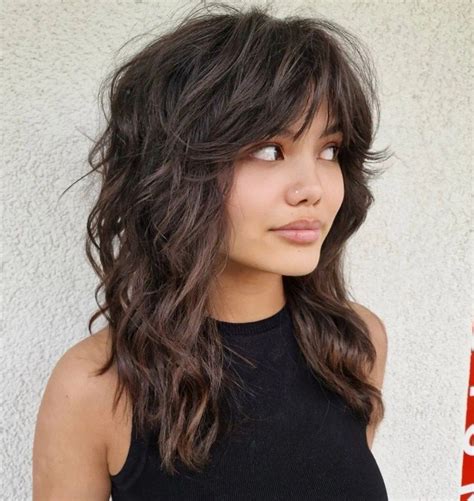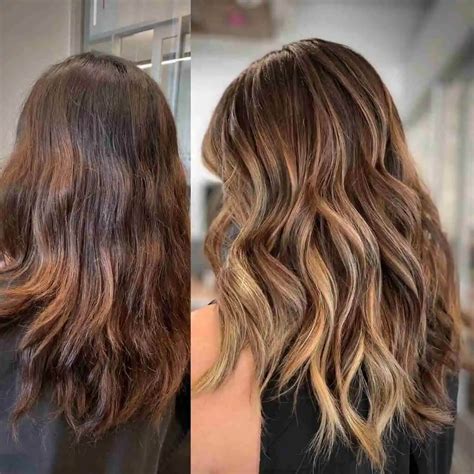In the ever-evolving world of hair coloring, balayage has emerged as a dominant trend, captivating hearts with its natural-looking, sun-kissed glow. However, when it comes to balayage, the age-old question arises: partial vs full? This comprehensive guide will delve into the intricacies of each technique, empowering you to make an informed decision that best suits your hair goals.

Balayage Partial vs Full: Understanding the Basics
Partial Balayage:
- Focuses on lightening specific sections of hair, creating soft, blended highlights.
- Typically involves painting on the bleach or color to only the ends or mid-lengths of the hair.
- Results in a more subtle, low-maintenance look that mimics natural lightening.
Full Balayage:
- Involves lightening the entire head of hair, from root to tip.
- Creates a more dramatic, glamorous look with high-contrast highlights.
- Requires more upkeep and touch-ups due to the greater amount of hair being bleached.
Pros:
- Low maintenance: Requires less frequent touch-ups, making it time-efficient and budget-friendly.
- Natural-looking: Aims to create the illusion of sun-kissed strands, resulting in a softer, more blended finish.
- Versatile: Can be customized to suit individual face shapes, hair textures, and desired intensity.
Cons:
- Less dramatic: May not provide the same level of contrast or vibrancy as a full balayage.
- Not ideal for dark hair: May require multiple sessions to achieve desired results on darker hair colors.
Pros:
- Bold and glamorous: Delivers a high-impact look with striking highlights that frame the face.
- Complements all hair colors: Can be tailored to suit blonde, brunette, or even red hair tones.
- Creates dimension: Adds depth and texture to the hair, making it appear fuller and more voluminous.
Cons:
- High maintenance: Requires regular touch-ups to prevent fading, making it more time-consuming and costly.
- Potential for damage: The use of strong bleach can weaken the hair, especially if not properly applied or maintained.
- Not all hair types are suitable: Fine or fragile hair may not withstand the bleaching process involved in full balayage.
Making the Decision: Balayage Partial vs Full
The choice between partial and full balayage ultimately depends on your personal preferences, hair type, and desired outcome.
- For a subtle, low-maintenance look: Partial balayage is recommended.
- For a bolder, more glamorous effect: Full balayage is preferred.
- For dark hair: Full balayage may be necessary to achieve visible results.
- For fine or damaged hair: Partial balayage is less likely to cause excessive damage.
- Consider your skin tone: Warm skin tones complement golden blonde or caramel highlights, while cool skin tones suit ash blonde or beige tones.
- Balance your face shape: Round faces look best with face-framing highlights, while oval faces can handle bolder, full balayage.
- Respect your hair’s health: Consult with a professional stylist to determine the appropriate bleach strength and frequency of touch-ups for your hair type.
- Invest in quality products: Use salon-grade shampoos and conditioners to preserve the vibrancy of your balayage and prevent fading.
- Section the hair into manageable segments.
- Apply bleach or color to the desired sections, using a sweeping motion to create soft transitions.
- Process the bleach or color according to the manufacturer’s instructions.
- Rinse and condition the hair to remove any residual chemicals.
- Style as desired.
- Customizable: Allows for tailored results that complement individual features and hair textures.
- Natural-looking: Mimics sun-kissed hair, creating a soft, blended finish.
- Low maintenance: Requires less frequent touch-ups, saving time and money.
- Enhances hair color with subtle highlights.
- Adds dimension and depth to the hair.
- Creates a more youthful and radiant appearance.
Table 1: Balayage Partial vs Full Comparison
| Feature | Partial Balayage | Full Balayage |
|---|---|---|
| Lightening Area | Specific sections of hair | Entire head of hair |
| Intensity | Subtle, blended highlights | Dramatic, high-contrast highlights |
| Maintenance | Low maintenance | High maintenance |
| Hair Damage | Less likely to damage hair | May damage hair if not properly applied |
| Cost | Less expensive | More expensive |
Table 2: Ideal Candidates for Balayage Partial
| Hair Color | Ideal for | Not Ideal for |
|---|---|---|
| Blonde | Yes | No |
| Brunette | Yes | May require multiple sessions |
| Redhead | Yes | Yes, but may alter the tone of the red |
| Fine hair | Yes | Use with caution, may damage fine hair |
| Thick hair | Yes | Yes, may require more bleach to achieve desired results |
Table 3: Ideal Candidates for Balayage Full
| Hair Color | Ideal for | Not Ideal for |
|---|---|---|
| Blonde | Yes | No |
| Brunette | Yes | Yes, may require multiple sessions |
| Redhead | Yes | Yes, but may alter the tone of the red |
| Fine hair | No | May severely damage fine hair |
| Thick hair | Yes | Yes, may require more bleach to achieve desired results |
Table 4: Balayage Partial vs Full Pricing Comparison
| Salon | Partial Balayage | Full Balayage |
|---|---|---|
| Salon A | $150-$250 | $250-$350 |
| Salon B | $200-$300 | $300-$450 |
| Salon C | $180-$280 | $280-$400 |
Disclaimer: Pricing may vary depending on salon location, stylist experience, and hair length and texture.
Conclusion
The decision between balayage partial vs full is a personal one that requires consideration of your hair goals, hair type, and lifestyle. Partial balayage is ideal for those seeking a natural-looking, low-maintenance enhancement, while full balayage delivers a bolder, more dramatic look. By understanding the nuances of each technique and following the tips and tricks provided, you can confidently choose the balayage method that best suits your needs and empowers you to achieve your hair aspirations.
